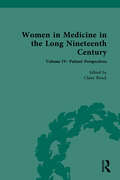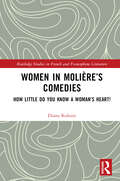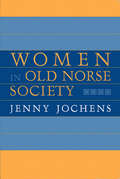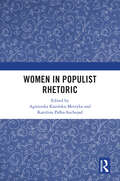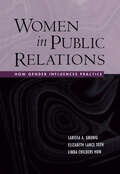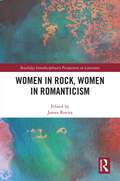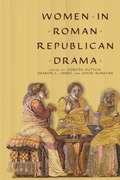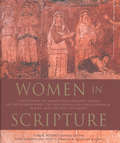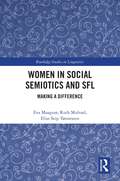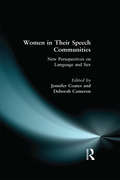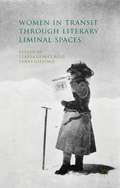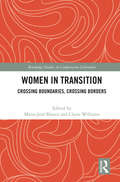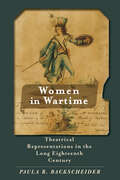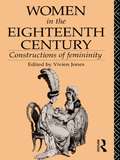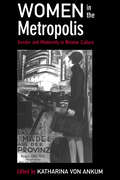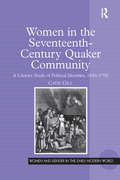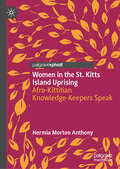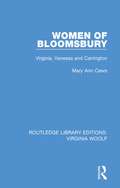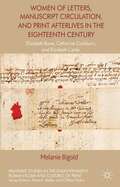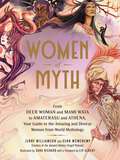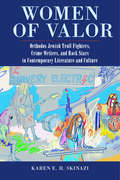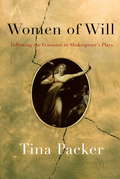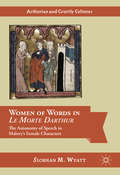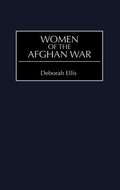- Table View
- List View
Women in Medicine in the Long Nineteenth Century: Volume IV: Patient Perspectives (Nineteenth-Century Science, Technology and Medicine: Sources and Documents)
by Claire BrockVital to the acceptance of medical women was the willingness of patients – largely women and children – to be treated by them. By the end of 1914, this more usual patient base was expanded to include injured soldiers. To provide a full consideration of the medical and surgical world of this period, it is necessary to explore patients in order to explore how gender affected the relationship between patient and practitioner. This volume examines the contemporary fear that hospital patients, mostly of working-class origin, were being experimented upon by their overly eager, ambitious, and vivisecting doctors; something in which surgeons especially were seen to be complicit. Women too, however, carried out abdominal and gynaecological surgery, and performed clitoridectomies. How medical women justified their actions, as well as how their patients viewed them, is the focus of this volume. Additionally, the voice of those who experienced ‘medical tyranny’ is considered to examine what happened when patients fought back publicly against the medical establishment. Accompanied by extensive editorial commentary, this title will be of great interest to students of Women's History and the History of Medicine.
Women in Molière’s Comedies: How Little Do You Know a Woman’s Heart! (Routledge Studies in French and Francophone Literature)
by Diana KoloiniThis book offers a new approach to the work of the great classical author. Molière’s is obviously a patriarchal world in which women are most often treated as objects of patriarchal autocracy, which expects their submission. Yet in a number of his plays, women display ample resourcefulness in countering the patriarchal rule, often managing to outwit it. To explore this topic, the book scrutinizes Molière’s most important comedies, The School for Wives, Tartuffe, The Misanthrope, and Don Juan, all of which feature complex female characters who play important roles. They show that Molière acknowledged a fully valid space for women and recognized their right to their own lives. As a prelude, the book analyzes two comedies from the margins of Molière’s oeuvre, The Ridiculous Précieuses and The Learned Ladies, which provoked controversy and indignant feminist criticism, since they appear to deride the emancipatory efforts of the time.
Women in Old Norse Society
by Jenny JochensJenny Jochens captures in fascinating detail the lives of women in pagan and early Christian Iceland and Norway: their work, sexual behavior, marriage customs, reproductive practices, familial relations, leisure activities, religious practices, and legal constraints and protections. Much of this information also applies to everyday life in the entire Germanic world. Conveying the experiences not only of aristocrats but also of ordinary farmers, the author draws from her extensive knowledge of the oldest and fullest record of the Germanic tribes.Women in Old Norse Society places particular emphasis on changing sexual mores and the impact of the imposition of Christianity by the clergy and the Norwegian kings. It also demonstrates the vital role women played in economic production: homespun was used for every conceivable domestic purpose; the lengths of cloth became the standard of measurement for local commercial exchange and were used to obtain commodities abroad.Jochens's masterly command of the Old Norse narratives and legal texts enables her to provide a rich social history that includes the fullest analysis to date of pagan and Christian marriage and the first comprehensive study of infanticide in the North.
Women in Populist Rhetoric
by Agnieszka Kasińska-Metryka and Karolina Pałka-SuchojadAt a time of increasing right-wing populism, Women in Populist Rhetoric examines the relationship between populist rhetoric and the real social changes that affect women and how populists gain prominence through the support they receive.Covering a broad spectrum of right-wing group activity in Western, Central and Eastern Europe - including Hungary, France, and Czechia - this volume takes an important look at the phenomena at the level of leadership and the practice of its operation. The book is divided into four parts: the first describes the phenomenon of right-wing populism, the second examines language as a tool of populist influence, and the third and fourth analyse the narratives of populist parties towards women across different European countries.An important text for the present moment, Women in Populist Rhetoric is an invaluable text for students of politics, sociology, and gender studies.
Women in Public Relations: How Gender Influences Practice
by Elizabeth L. Toth Larissa A. Grunig Linda Childers HonThe past 20 years have seen an influx of women into the practice of public relations, yet gender-based disparities in pay and advancement remain a troubling reality. As the field becomes feminized, moreover, female and male practitioners alike confront the prospect of dwindling salaries and prestige. This landmark book presents a comprehensive examination of the status of women in public relations and proposes concrete ways to achieve greater parity in education and practice. The authors integrate the theoretical literature of public relations and gender with results of a major longitudinal study of women in the field, along with illuminating focus group and interview data. Topics covered include factors contributing to sex discrimination; how public relations stacks up against other professions on gender-related issues; the challenges facing female managers and entrepreneurs; the experiences of ethnic minority professionals; the salary gap; the glass ceiling; and how to foster solutions on individual, organizational, and societal levels. This volume is an essential read for both educators and practitioners in public relations. It can be used as a course text in graduate research seminars, and also as a supplemental text in courses addressing gender issues in PR. It serves as a useful guide for young practitioners entering the profession, and provides critical insights for public relations managers.
Women in Rock, Women in Romanticism (Routledge Interdisciplinary Perspectives on Literature)
by Rovira JamesWomen in Rock, Women in Romanticism is the first book-length work to explore the interrelationships between contemporary female musicians and eighteenth- and nineteenth-century art, music, and literature by women and men. The music and videos of contemporary musicians including Erykah Badu, Beyoncé, The Carters, Hélène Cixous, Missy Elliot, the Indigo Girls, Janet Jackson, Janis Joplin (and Big Brother and the Holding Company), Natalie Merchant, Joni Mitchell, Janelle Monáe, Alanis Morrisette, Siouxsie Sioux, Patti Smith, St. Vincent (Annie Clark), and Alice Walker are explored through the lenses of pastoral and Afropresentism, Gothic, female Gothic, and the literature of William Blake, Beethoven, Arthur Schopenhauer, Samuel Taylor Coleridge, Charlotte Dacre, Ralph Waldo Emerson, E.T.A. Hoffmann, Ann Radcliffe, William Shakespeare, Mary Shelley, her husband Percy Shelley, Henry David Thoreau, Horace Walpole, Jane Williams, Mary Wollstonecraft, and William Wordsworth to explore how each sheds light on the other, and how women have appropriated, responded to, and been inspired by the work of authors from previous centuries.
Women in Roman Republican Drama
by Sharon L. James David Konstan Dorota DutschLatin plays were written for audiences whose gender perspectives and expectations were shaped by life in Rome, and the crowds watching the plays included both female citizens and female slaves. Relationships between men and women, ideas of masculinity and femininity, the stock characters of dowered wife and of prostitute all of these are frequently staged in Roman tragedies and comedies. This is the first book to confront directly the role of women in Roman Republican plays of all genres, as well as to examine the role of gender in the influence of this tradition on later dramatists from Shakespeare to Sondheim. "
Women in Scripture: A Dictionary of Named and Unnamed Women in the Hebrew Bible, the Apocryphal/Deuterocanonical Books and the New Testament
by Toni Craven Carol Meyers Ross S. Kraemer&“This splendid reference describes every woman in Jewish and Christian scripture . . . monumental&” (Library Journal). In recent decades, many biblical scholars have studied the holy text with a new focus on gender. Women in Scripture is a groundbreaking work that provides Jews, Christians, or anyone fascinated by a body of literature that has exerted a singular influence on Western civilization a thorough look at every woman and group of women mentioned in the Bible, whether named or unnamed, well known or heretofore not known at all. They are remarkably varied—from prophets to prostitutes, military heroines to musicians, deacons to dancers, widows to wet nurses, rulers to slaves. There are familiar faces, such as Eve, Judith, and Mary, seen anew with the full benefit of the most up-to-date results of biblical scholarship. But the most innovative aspect of this book is the section devoted to the many females who in the scriptures do not even have names. Combining rigorous research with engaging prose, these articles on women in the Hebrew Bible, the Apocryphal/Deuterocanonical Books, and the New Testament will inform, delight, and challenge readers interested in the Bible, scholars and laypeople alike. Together, these collected histories create a volume that takes the study of women in the Bible to a new level.
Women in Social Semiotics and SFL: Making a Difference (Routledge Studies in Linguistics)
by Elise Seip Tønnessen Eva Maagerø Ruth MulvadThis book showcases interviews with nine women who have made pioneering contributions to social semiotics and systemic functional linguistics (SFL), highlighting how these women have taken the discipline into new and innovative directions, and the enduring impact of their work. The volume features interviews with a generation of scholars inspired by the prominent linguists Michael Halliday and Ruqaiya Hasan in Sydney, reflecting on their achievements in the advancement of theory, knowledge, and practical application as well as the establishment of research centers in different parts of the world. A consistent interview format helps to illustrate the different directions the work of these scholars has taken and their different takes on key concepts to the discipline such as register, genre, text and context, and multimodality. Taken together, the interviews offer insights into key strands of social semiotic and SFL scholarship and give inspiration toward moving the field into new theoretical and applied directions. Reflecting on the groundbreaking work of renowned women scholars in social semiotics and SFL and their continued global impact, this book will be key reading for students and scholars in these fields, as well as those in the areas of language pedagogy, literacy, and multimodality.
Women in Their Speech Communities
by Jennifer Coates and Deborah CameronThis collection of essays presents a picture of research on women and language in Britain. The contributors cover a range of British speech communities, linguistic events and settings using approaches from sociolinguistics and discourse analysis.
Women in Transit through Literary Liminal Spaces
by Terry Gifford Teresa Gomez ReusThis edited book provides a unique opportunity for international scholars to contribute to the exploration of liminality in the field of Anglo-American literature written by or about women between the Victorian period and the Second World War.
Women in Transition: Crossing Boundaries, Crossing Borders (Routledge Studies in Comparative Literature)
by Maria-José Blanco and Claire WilliamsThis volume brings together scholars, students and writers as well as artists from around the world. By choosing a thematic focus on "transition" in women’s lives, we present research on women who have crossed biological, geopolitical and political borders as well as emotional, sexual, cultural and linguistic boundaries. The international approach brings together different cultures and genres in order to emphasize the links and connections that bind women together, rather than those which separate them. The chapters consider the ways in which the changes and transitions women undergo influence the world we live in. We are particularly interested in the idea of crossing borders and how this influences identity and belonging, and the theme of crossing boundaries in the context of motherhood as well as sexual orientation. The topic is timely given the waves of migration all around the world in recent times. The contributors deal with issues central to contemporary life, such as gender equality and women’s empowerment, as well as understanding women’s identities and being sensitive to fluid concepts of gender and sexuality.
Women in Wartime: Theatrical Representations in the Long Eighteenth Century
by Paula R. BackscheiderA revelatory history of the characters that playwrights and managers created out of the real lives of women in intimate relationships with military men to serve Great Britain's greatest needs during the war-saturated eighteenth century.During the long eighteenth century, Great Britain was almost continuously at war. As the era unfolded, the theatre gradually discovered the potential in having actresses, recently introduced to the stage in the 1660s, perform as wartime women characters. As playwrights and managers began casting women in transformative roles to meet each major national need, female characters came to be central figures in bringing the war home to the nation, transforming them into deeply patriotic British subjects.Paula Backscheider's Women in Wartime is the first study of theatrical representations of women with intimate connections to military men. Drawing upon her extensive expertise in gender, performance studies, popular culture, and archival studies, Backscheider traces the rise of the London theatre's acceptance that one of its responsibilities was to support its country's wars. Rather than focusing on the historical, mythical "warrior women" on the battlefield who have been much studied, Backscheider explores the lives and work of sweethearts, wives, mothers, sisters, barmaids, provision sellers, seaport prostitutes, and more, whose relationships to active-duty men made them recruits, volunteers, or even conscripts. They represent a distinct group of thousands of real women, and the actresses who portrayed them gave performances of change, struggle, celebration, mourning, survival, love, and patriotism. Backscheider explicates more than fifty plays—from main pieces, short farces, interludes, afterpieces, and comic operas to entr'actes, pantomimes, and even masques—as both entertainment and as ideological and propagandistic vehicles in times of severe crises. She also reveals how these works, many written by men with military experience, attest to the context of difficult, inescapable realities and momentous needs. Through the debunking of sexual stereotypes and attention to audience-pleasing roles such as impoverished-wife and breeches parts, Backscheider adds a dimension to theatrical history that substantially contributes to women's and military histories. Women in Wartime demonstrates the startling acuity and prescience of the repertoire in responding to the war-steeped culture of the period.
Women in the Eighteenth Century: Constructions of Femininity (World and Word)
by Vivien JonesThis anthology gathers together various texts by and about women, ranging from `conduct' manuals to pamphlets on prostitution, from medical texts to critical definitions of women's writing, from anti-female satires to appeals for female equality. By making this material more widely available, Women in the Eighteenth Century complements the current upsurge in feminist writing on eighteenth-century literary history and offers students the opportunity to make their own rereadings of literary texts and their ideological contexts.
Women in the Metropolis: Gender and Modernity in Weimar Culture (Weimar and Now: German Cultural Criticism #11)
by Katharina von AnkumBringing together the work of scholars in many disciplines, Women in the Metropolis provides a comprehensive introduction to women's experience of modernism and urbanization in Weimar Germany. It shows women as active participants in artistic, social, and political movements and documents the wide range of their responses to the multifaceted urban culture of Berlin in the 1920s and 1930s.Examining a variety of media ranging from scientific writings to literature and the visual arts, the authors trace gendered discourses as they developed to make sense of and regulate emerging new images of femininity. Besides treating classic films such as Metropolis and Berlin: Symphony of a Great City, the articles discuss other forms of mass culture, including the fashion industry and the revue performances of Josephine Baker. Their emphasis on women's critical involvement in the construction of their own modernity illustrates the significance of the Weimar cultural experience and its relevance to contemporary gender, German, film, and cultural studies.
Women in the Seventeenth-Century Quaker Community: A Literary Study of Political Identities, 1650–1700 (Women and Gender in the Early Modern World)
by Catie GillFocussing on Quaker pamphlet literature of the commonwealth and restoration period, Catie Gill seeks to explore and explain women’s presence as activists, writers, and subjects within the early Quaker movement. Women in the Seventeenth-Century Quaker Community draws on contemporary resources such as prophetic writing, prison narratives, petitions, and deathbed testimonies to produce an account of women’s involvement in the shaping of this religious movement. The book reveals that, far from being of marginal importance, women were able to exploit the terms in which Quaker identity was constructed to create roles for themselves, in public and in print, that emphasised their engagement with Friends’ religious and political agenda. Gill’s evidence suggests that women were able to mobilise contemporary notions of femininity when pursuing active roles as prophets, martyrs, mothers, and political activists. The book’s focus on collective, Quaker identities, which arises from its analysis of multiple-authored texts, is key to its claims that gender issues have to be considered when analysing the sect’s emergent system of values, and Gill assesses the representation of women in male-authored texts in addition to female writers’ attitudes to agency. A bibliography that, for the first time, lists men and women’s involvement as contributors as well as authors to Quaker pamphlets provides a valuable resource for scholars of seventeenth-century radicalism.
Women in the St. Kitts Island Uprising: Afro-Kittitian Knowledge-Keepers Speak
by Hermia Morton AnthonyThis book details the perspectives of women of African ancestry who witnessed a twentieth-century uprising in St. Kitts. They chronicle the story of how they and other women of African descent navigated the slavery afterlife on an island dominated by sugar plantations, institutions, and laws that reinforced enslavement 100 years after the Act to Abolish Slavery had been passed. The stories highlight the women's political consciousness, leadership and participation in the protracted liberation struggle to reclaim their humanity, and collaterally decenter the colonized version of the event that has dominated accounts of the historical moment. They reveal the agility of the strategies women utilized including religious rituals, arson, a network of children to communicate messages within and between villages, on occasion taking the frontlines of the protest, providing sanctuaries for protestors, and serving expertly as character witnesses and alibis in court trials of persons who were charged as rioters. Their first language - an oral, ancestral proto-language, yet unnamed, and facing extinction - is incorporated into the history to honour their memory. Their remarkable memories reveal a noticeable shift in understanding of the uprising, and the dynamics of the defining moment in Caribbean history. The book encourages us to think critically about the subjects of history and who tells the story.
Women of Bloomsbury: Virginia, Vanessa and Carrington (Routledge Library Editions: Virginia Woolf #2)
by Mary Ann CawsOriginally published in 1990, Women of Bloomsbury takes a fresh look at the lives of Virginia Woolf, her sister Vanessa Bell, and Dora Carrington. Connected by more than bonds of friendship and artistic endeavour, the three women faced similar struggles. Juxtaposing their personal lives and their work, Mary Ann Caws shows us with feeling and clarity the pain women suffer in being artists and in finding – or creating – their sense of self. Relying on unpublished letters and diaries, as well as familiar texts, Caws give us a portrait of the female self in the act of creation.
Women of Letters, Manuscript Circulation, and Print Afterlives in the Eighteenth Century
by Melanie BigoldUsing unpublished manuscript writings, this book reinterprets material, social, literary, philosophical and religious contexts of women's letter-writing in the long 18th century. It shows how letter-writing functions as a form of literary manuscript exchange and argues for manuscript circulation as a method of engaging with the republic of letters.
Women of Myth: From Deer Woman and Mami Wata to Amaterasu and Athena, Your Guide to the Amazing and Diverse Women from World Mythology
by Jenny Williamson Genn McMenemyUncover the fascinating and complex women from mythology and folklore with this collection of stories profiling powerful goddesses, mighty queens, and legendary creatures.Get inspired with 50 fascinating stories of powerful female figures from mythologies around the world. From heroines and deities to leaders and mythical creatures, this collection explores figures of myth who can inspire modern readers with their ability to shape our culture with the stories of their power, wisdom, compassion, and cunning. Featured characters include: -Atalanta: Greek heroine and huntress who killed the Caledonia Boar and joined the Argonauts -Sky-Woman: The first woman in Iroquois myth who fell through a hole in the sky and into our world -Pele: Hawaiian volcano goddess -Clídna: Queen of the Banshees in Irish legend -La Llorona: A ghostly woman in Mexican folklore who wanders the waterfront Celebrate these game-changing, attention-worthy female characters with this collection of engaging tales.
Women of Valor: Orthodox Jewish Troll Fighters, Crime Writers, and Rock Stars in Contemporary Literature and Culture
by Karen E. SkinaziMedia portrayals of Orthodox Jewish women frequently depict powerless, silent individuals who are at best naive to live an Orthodox lifestyle, and who are at worst, coerced into it. Karen E. H. Skinazi delves beyond this stereotype in Women of Valor to identify a powerful tradition of feminist literary portrayals of Orthodox women, often created by Orthodox women themselves. She examines Orthodox women as they appear in memoirs, comics, novels, and movies, and speaks with the authors, filmmakers, and musicians who create these representations. Throughout the work, Skinazi threads lines from the poem “Eshes Chayil,” the Biblical description of an Orthodox “Woman of Valor.” This proverb unites Orthodoxy and feminism in a complex relationship, where Orthodox women continuously question, challenge, and negotiate Orthodox and feminist values. Ultimately, these women create paths that unite their work, passions, and families under the framework of an “Eshes Chayil,” a woman who situates religious conviction within her own power.
Women of Will
by Tina PackerFrom one of the country's foremost experts on Shakespeare and theatre arts, actor, director, and master teacher Tina Packer offers an exploration--fierce, funny, fearless--of the women of Shakespeare's plays. A profound, and profoundly illuminating, book that gives us the playwright's changing understanding of the feminine and reveals some of his deepest insights. Packer, with expert grasp and perception, constructs a radically different understanding of power, sexuality, and redemption. Beginning with the early comedies (The Taming of the Shrew, Two Gentlemen of Verona, The Comedy of Errors), Packer shows that Shakespeare wrote the women of these plays as shrews to be tamed or as sweet little things with no definable independent thought, virgins on the pedestal. The women of the histories (the three parts of Henry VI; Richard III) are, Packer shows, much more interesting, beginning with Joan of Arc, possibly the first woman character Shakespeare ever created. In her opening scene, she's wonderfully alive--a virgin, true, sent from heaven, a country girl going to lead men bravely into battle, the kind of girl Shakespeare could have known and loved in Stratford. Her independent resolution collapses within a few scenes, as Shakespeare himself suddenly turns against her, and she yields to the common caricature of his culture and becomes Joan the Enemy, the Warrior Woman, the witch; a woman to be feared and destroyed . . . As Packer turns her attention to the extraordinary Juliet, the author perceives a large shift. Suddenly Shakespeare's women have depth of character, motivation, understanding of life more than equal to that of the men; once Juliet has led the way, the plays are never the same again. As Shakespeare ceases to write about women as predictable caricatures and starts writing them from the inside, embodying their voices, his women become as dimensional, spirited, spiritual, active, and sexual as any of his male characters. Juliet is just as passionately in love as Romeo--risking everything, initiating marriage, getting into bed, fighting courageously when her parents threaten to disown her--and just as brave in facing death when she discovers Romeo is dead. And, wondering if Shakespeare himself fell in love (Packer considers with whom, and what she may have been like), the author observes that from Juliet on, Shakespeare writes the women as if he were a woman, giving them desires, needs, ambition, insight.Women of Will follows Shakespeare's development as a human being, from youth to enlightened maturity, exploring the spiritual journey he undertook. Packer shows that Shakespeare's imagination, mirrored and revealed in his female characters, develops and deepens until finally the women, his creative knowledge, and a sense of a larger spiritual good come together in the late plays, making clear that when women and men are equal in status and sexual passion, they can--and do--change the world. Part master class, part brilliant analysis--Women of Will is all inspiring discovery.From the Hardcover edition.
Women of Words in Le Morte Darthur
by Siobhán M. WyattOffering a new reading of Malory's famed text, Le Morte Darthur, this book provides the first full-length survey of the alterations Malory made to female characters in his source texts. Through detailed comparisons with both Old French and Middle English material, Siobh#65533;n M. Wyatt discusses how Malory radically altered his French and English source texts to create a gendered pattern in the reliability of speech, depicting female discourse as valuable and truthful. Malory's authorial crafting indicates his preference for a certain "type" of female character: self-governing, opinionated, and strong. Simultaneously, the portrayal of this very readable "type" yields characterization. While late medieval court records indicate an increasingly negative attitude towards female speech and a tendency to punish vociferous women as "scolds," Malory makes the words of chiding damsels constructive. While his contemporary writers suppress the powers of magical women, Malory empowers his enchantress characters; while the authors of his French source texts accentuate Guinevere's flaws, Malory portrays her with sympathy.
Women of the Afghan War
by Deborah EllisThis is a book about women of Afghanistan and how they cope with war.
